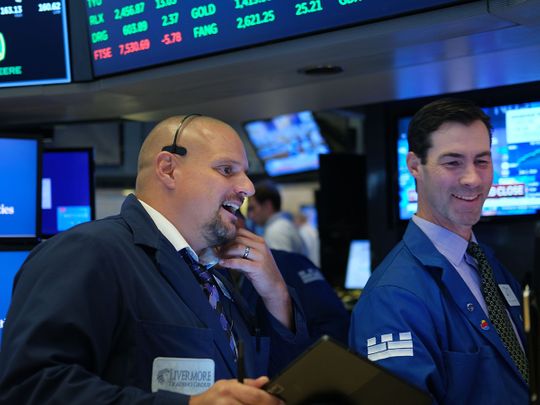
Dubai: With another round of earnings picking up steam, investors will keep an eye out for any lasting effects from the pandemic, along with news of any progress on any potential vaccine against COVID-19.
On Wall Street and markets elsewhere, earnings season is in full swing, and dozens of companies report in the week ahead, including corporate giants like Microsoft, Intel, American Express, Tesla and Twitter.
Vaccine news to dominate
Analysts however said any news of progress on the vaccine front will paint the market more than the top- and bottom-line results companies are scheduled to post next week, which are largely expected to come in better-than-expected as most economies reopened for business post-lockdowns.
Also falling on global investors’ radar is the world’s largest economy beginning to debate about a new trillion dollar plus stimulus package that would address how much government aid can be availed in the current situation where new infections are rising.
Outlook still uncertain
“Going forward, the outlook remains uncertain as the resurgence in new COVID-19 cases could possibility slowdown the global economic recovery,” said Iyad Abu Hweij, managing director at Allied Investments Partners PJSC.
Strategists said the market could react to the deliberations if they take longer than expected, or the funds are viewed as insufficient.
Caution on new infections
The spread of the coronavirus will also be closely monitored, as well as any signs of medical progress. The Lancet medical journal is expected to release early stage human trial data Monday on a vaccine developed by Oxford University and AstraZeneca.
Trading was mixed Friday in a relatively sedate day on Wall Street, which reflected the sentiment in markets worldwide. The Dow Jones slipped 0.23 per cent, while the S&P 500 rose 0.28 per cent and the Nasdaq Composite advanced 0.28 per cent.
The US Nasdaq benchmark reversed course last week after a surge of outperformance, lagging the other major indices. This was attributed to cautious trading of stocks of tech titans in the index, that have rallied strongly despite the pandemic, with investors eyeing whether they will let out steam slowly or correct more sharply.
Day of mixed trading for UAE, GCC bourses
Dubai and Abu Dhabi stock market indices started off the week trading in opposite directions. While the Dubai Financial Market (DFM) gained 0.4 per cent at 2,061 points, while the Abu Dhabi Securities Market (ADX) fell just as much at 4,255 points.
Tracking global stock markets, the Dubai and Abu Dhabi bourse benchmarks have been cautiously rebounding the past weeks, with the existing trend seen continuing.
After dropping about 4 per cent in the month of May, the Dubai Financial Market (DFM) rose 6 per cent in the month of June. Similarly, the Abu Dhabi Securities Market (ADX) slipped 2 per cent in May and rose 3.5 per cent last month.
The sentiment was reflected elsewhere in the Gulf states, with most major stock markets in the region trading cautiously on Sunday, as corporate results trickled in after July 15. Saudi Arabia’s benchmark index edged up 0.2 per cent, while in Qatar, the index gained 0.4 per cent.
In the region, equity markets have been underperforming the global markets the past weeks, which can be largely attributed to depressed oil prices and its subsequent impact on the regional economies.
“For the MENA region, performance of the equity markets (going forward) will be dominated by movement in oil prices and upcoming earnings season,” Iyad Abu Hweij added.
Oil giant Saudi Aramco dropped 0.5 per cent in early trade, as talks over the sale of a 20 per cent stake in Reliance Industries Ltd to Saudi Aramco have stalled over price, Reuters reported, citing four sources familiar with the matter.
Notable losses were recorded by the Kuwaiti benchmark, which retreated 1 per cent, as most of its stocks traded in negative territory and after S&P Global Ratings revised the Gulf state’s outlook to ‘negative’ from ‘stable’.
The ratings agency said it expects Kuwait’s main liquidity buffer, the General Reserve Fund (GRF), to be insufficient to cover central government deficit.








